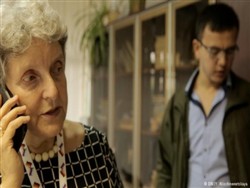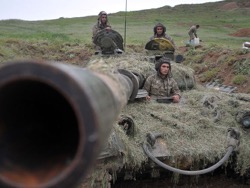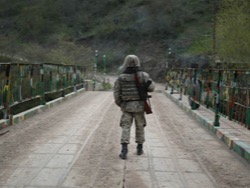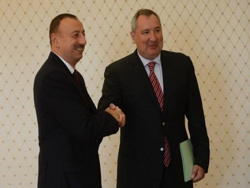
Russian human rights activist of svetalana Gannushkina received the alternative Nobel prize in Sweden. About Gannushkina, led by her Committee, and assistance to refugees in the portrait from DW.
Thursday, September 22, the Swedish Fund the Right Livelihood Award Foundation has awarded a Russian human rights activist Svetlana Gannushkinu award “For the correct way of life”, which is also often called the alternative Nobel. Gannushkina head of the Committee “Civil assistance” and for more than 25 years helping refugees from around the world, doing the work, which, according to the UN Convention on refugees, the government should do. But to help the authorities that the Committee should not count.
Karabakh
It all started in the late eighties, together with the conflict in Nagorno-Karabakh. Moscow intelligentsia massively supported Armenia. But Svetlana Gannushkina, who then taught mathematics at a Moscow University, he went to Azerbaijan to see the other side of the conflict.
“There I first met with the refugees – says human rights activist. – It was the common people, the peasants, who in General are likely about this the Karabakh problem, and maybe about the word “Karabakh” didn’t know. However, they were expelled and went through the pass, in winter, in the month of December…”
Gannushkina is recognized that this trip has predetermined her fate: “She for me, all the conflicts shared exactly in the perpendicular direction. Not between the Armenian and Azerbaijani side, or Ossetian and Ingush, and those who derive dividends from war, and those who are suffering.”
Back in Moscow, Svetlana Gannushkina engaged in peacekeeping: “Neither in Armenia nor in Azerbaijan was not of the Commission on missing persons. I collected the lists of the missing, they were passed through my house. Representatives of the warring parties met me, sat in the kitchen, drinking my brandy and scolded “elder brother”.
Assistance to refugees
Many expected the war to the outskirts of the Empire will end soon. But they were pumped and the capital of Russia began to flock to the new refugees. First there was the wave from Armenia and Azerbaijan, then Abkhazia, South Ossetia, Tajikistan, Chechnya then. Through created Gannushkina, the Committee “Civil assistance” took the whole post-Soviet history. First, refugees were accepted in the edition of “Literary Gazette”, where he worked for a friend Gannushkina, journalist and human rights activist Lidia Grafova. Then there was a basement in the center of Moscow.
Committee volunteers collected old clothes, coupons for sugar, but at some point it became clear that this is not enough. Many refugees do not have documents, others only preserved the old Soviet system, the third was a passport, but no registration. So the organization of charity turned into a human rights – today Gannushkina not only advises refugees in Moscow and manages a network of legal consultacy “Migration and law”, which has dozens of outlets across Russia.
Since 1998, the organization receives funding from the office of the UN high Commissioner for refugees. International grants were given “Civil assistance” the opportunity to recruit not only volunteers but also professional translators, doctors, specialists in migration law.
Chechnya
The Chechen war was a special period in the life of the Committee – because the victims and the one and on the other hand, were citizens of Russia. During the second campaign, the Committee members traveled to Chechnya, helped to provide the necessary war-destroyed schools, were taken seriously ill for treatment to Moscow. “A very important role here played the guilt,” says Gannushkina. When you don’t want, but you’re responsible for those Russian generals who are there fighting and killing”.
From the war affected not only the Chechens Gannushkina with the same enthusiasm fought for the rights of ethnic Russians, who were forced to leave the North Caucasus. And today, when the agenda of the Ukrainian conflict, the Committee come the refugees from the Donbass in Russia, they have enough problems that the government refuses to solve. And the Committee is there to wait for help is not necessary: in 2015, the Ministry of justice declared the organization a foreign agent.
“It’s certainly a shame, but not for us, but for whoever comes up with,” – said Gannushkina. Under the new law, organizations declared foreign agents, are obliged to place this information on the website. In the “Civil assistance” have done so: I have photographs of Syrian, Afghan, African children and wrote: “We are agents of these aliens.”
“Not everything that is naturally good at“
In their work Gannushkina often faced with xenophobia, attempts to divide people into their foes. “I have often said: who are you protecting? You are confusing victims and executioners! And I had to repeatedly explain that the mother who hands the baby died from the cold, can not be anyone’s executioner. We do not defend one against the other, we’re just trying to force our government to fulfill its obligations.
Xenophobia is natural for a human being, recognizes Gannushkina. And said that he agreed with Konrad Lorenz, who wrote that all creatures tend to experience a negative attitude towards those who they’re closest to, with whom they occupy a common ecological niche.
“It’s natural. But not everything that is naturally good! And mankind with all its culture resists and opposes human cultured person natural. Xenophobia is not a disease, it’s our device that we have in its history to resist and to create new mechanisms to combat xenophobia, including in ourselves,” – says human rights activist.
How to spend the award
Alternative Nobel prize is not the first international award in the biography Gannushkina. She had already scored several awards from human rights and charitable funds. The money Gannushkina always spends on the needs of the Committee. For example, in 1997 the award of the Soros Foundation “selfless devotion” she was referred for treatment of one of the wards.
“It was a refugee from Georgia, had a brain aneurysm – vascular tumor. She pressed all of her brain, he already could not walk, could not see. From day to day could have caused a stroke. And it turned out that there is such a device that can do the surgery without opening the skull. As soon as the money came in I transferred to the Institute Bakuleva. And in two weeks the patient came to us on their feet.”
Alternative Nobel prize Svetlana Gannushkina is going to spend on rent, which will become a refuge for women who were forced to flee from family violence.







